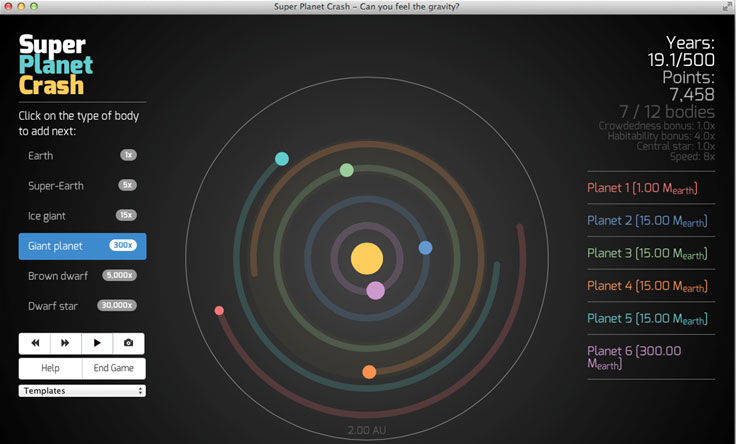TORONTO – First it was Chris Hadfield tweeting about life in space, then Neil deGrasse Tyson’s reboot of Carl Sagan’s Cosmos. Science is cooler than ever and now, a new game is putting a whole solar system in your hands.

A new game called Super Planet Crash shows you just how delicate solar systems are. And it’s making science pretty cool stuff.
READ MORE: Cosmos: Making science sexy again
The game seems simple enough to start: You’re given a star with one Earth-sized planet already orbiting it. Then, you simply add planets and watch them spin. But not all planets are created equally.
The planets come in different sizes, from Earth-sized to 5,000 times more massive than Earth. There’s even the option to add a dwarf star. The more dynamic your system, the harder it becomes to maintain over a longer period of time. Each body has a gravitational influence on the other.
The goal of the game is to see how long you can make a planetary system of your own within two astronomical units (AU), with the goal being 500 years (an astronomical unit or AU is the distance from Earth to the sun, 149,597,870.700 kilometres). You get extra points for the more bodies you have in your system.
The game’s creator, Stefano Meschiari of McDonald Observatory at the University of Texas, Austin, said that he always believed in citizen science, where the public can help take part in scientific discoveries. He helped create an online app called Systemic that allows anyone to search for exoplanets — planets around other stars — by using real data from telescopes around the world. But Meschiari felt that some of the tools were too difficult for people who may not have that sort of interest or training.
- 2021 heat dome fuelled by climate change, intensified wildfire risk: study
- B.C. introduces legislation recognizing Haida Gwaii Indigenous title
- Whale experts confident B.C. orca calf will survive, find family if rescue plan succeeds
- Plastic production cap still contentious as Ottawa set to host treaty talks
READ MORE: 5 cool space apps that put the universe in your hands
“So I decided to write a ‘gravity game,’ something that would appeal to the public at a more visceral level,” Meschiari said. “Both my fellow astronomer friends and my ‘regular’ friends were instantly hooked, so I knew I had something that had the potential to interest the public.”
And this addictive game is not only fun, but a learning tool.
“The game is going viral on the social networks right now, so even people that are not necessarily aware or interested in exoplanetary science will play the game,” said Meschiari.
“These people then learn something about gravity, say, how crowded planetary systems, or systems with lots of massive bodies, can quickly turn unstable in a matter of centuries, and see jargon that they might not have heard before…Hopefully, they will then want to know more about exoplanets.”
Asked what his high score is, Meschiari said, “My score is embarrassingly low because I have no patience.”


Comments